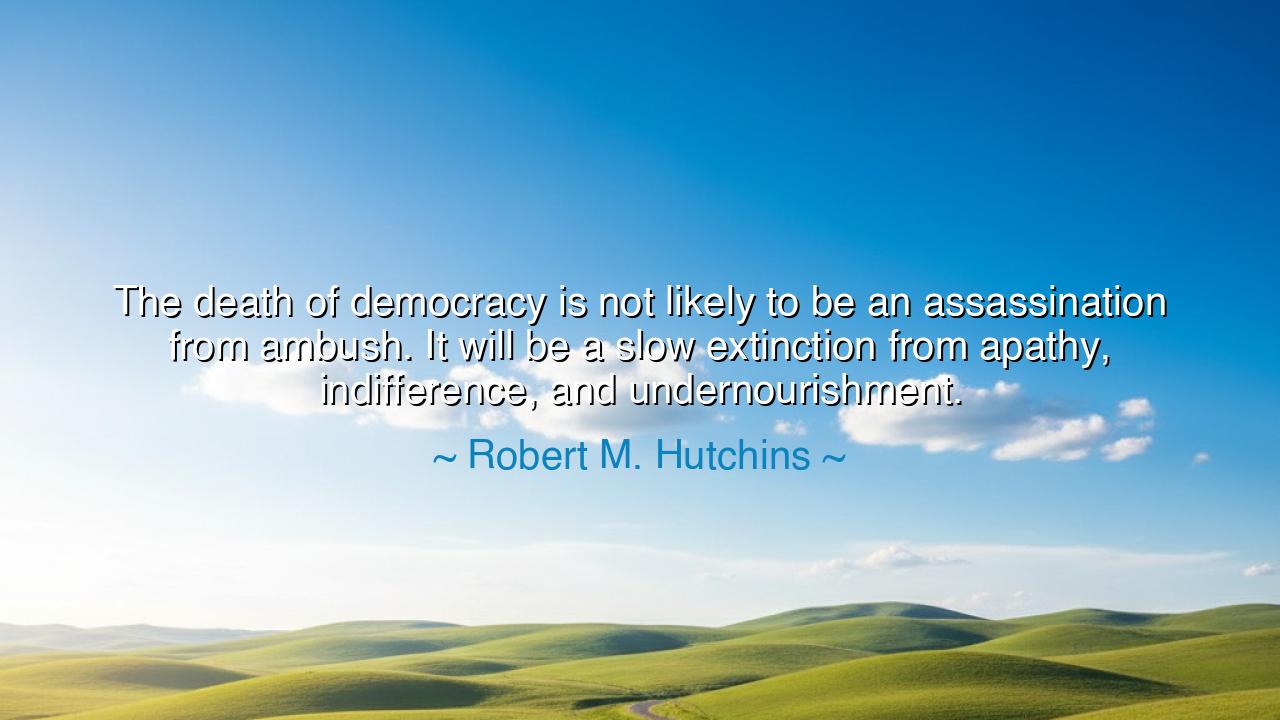
The death of democracy is not likely to be an assassination from
The death of democracy is not likely to be an assassination from ambush. It will be a slow extinction from apathy, indifference, and undernourishment.






The words of Robert M. Hutchins, “The death of democracy is not likely to be an assassination from ambush. It will be a slow extinction from apathy, indifference, and undernourishment,” are a warning written in the language of prophecy. They remind us that the fall of a nation, like the fading of a soul, seldom comes with thunder or flame — it comes quietly, by forgetfulness, by the slow dulling of conscience. Democracy, he tells us, does not perish in violence, but in neglect. It dies not when the tyrant strikes, but when the people cease to care.
In the ancient world, the philosophers knew this truth well. Plato, in The Republic, warned that the greatest threat to democracy lies not in external conquest but in internal decay. When citizens grow weary of responsibility and seek only pleasure or comfort, they surrender their freedom bit by bit until they wake beneath the rule of another. Thus, Hutchins speaks as a modern echo of those old voices, reminding us that freedom is not a gift, but a living flame that must be tended daily with thought, courage, and care.
Apathy is the frost that kills that flame. When men and women turn their eyes from the affairs of their community — when they say, “It is not my concern,” or “One voice cannot change the world” — they become the silent gravediggers of their own liberty. Democracy depends not on the might of armies or the eloquence of leaders, but on the vigilance of the ordinary soul, the humble citizen who continues to question, to vote, to speak, to think. Without this nourishment, the body of freedom starves.
History gives us many mirrors of this truth. Consider the fall of the Roman Republic. It was not destroyed by sudden conquest, but by centuries of corruption and apathy. Citizens ceased to believe in their own power; they traded civic duty for bread and spectacle. The Senate, once noble, became an echo chamber of ambition and greed. When Caesar crossed the Rubicon, the Republic was already dead in spirit — not slain by his sword, but withered by indifference. The people had grown used to ease, and so they lost the will to be free.
Hutchins saw the same danger in his own time — the 20th century — when war, propaganda, and complacency began to dull the public mind. He feared a generation that would mistake entertainment for truth, convenience for progress, and silence for peace. His warning was not merely political, but moral. For democracy, at its heart, is not a system of government but a way of life — a covenant of shared responsibility, trust, and engagement. When that covenant is forgotten, no constitution, however well written, can save it.
Yet his message is not one of despair, but of awakening. If democracy can die from apathy, then it can be reborn through participation. Each act of care — every vote, every honest word, every moment spent listening instead of judging — is a breath of life into the fragile lungs of liberty. To nourish democracy, we must feed it with education, empathy, and the courage to dissent. We must teach our children not only to obey laws, but to question them; not only to inherit freedom, but to protect it with both mind and heart.
So, let this truth be passed down like sacred fire: Freedom fades not in battle, but in boredom. The tyrant’s blade is swift, but the citizen’s indifference is deadlier still. Guard your democracy as the ancients guarded their temples — with reverence, with sacrifice, and with vigilance. Speak when silence is convenient, act when inaction feels safer, and keep your spirit awake even when the world drifts toward slumber.
For as Hutchins teaches, the death of democracy is not sudden — it is slow, quiet, and self-inflicted. But so too is its salvation: one act of care, one conscience awakened, one heart rekindled at a time. And if enough hearts burn brightly, no darkness — not apathy, nor indifference, nor tyranny — can ever extinguish the light of freedom.






AAdministratorAdministrator
Welcome, honored guests. Please leave a comment, we will respond soon